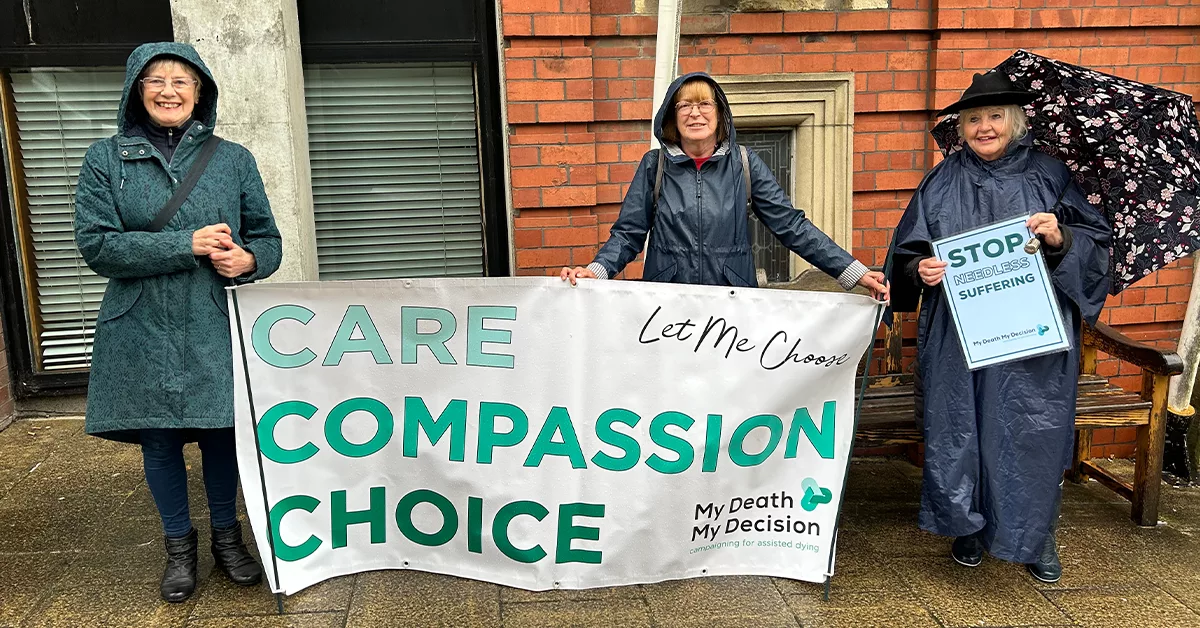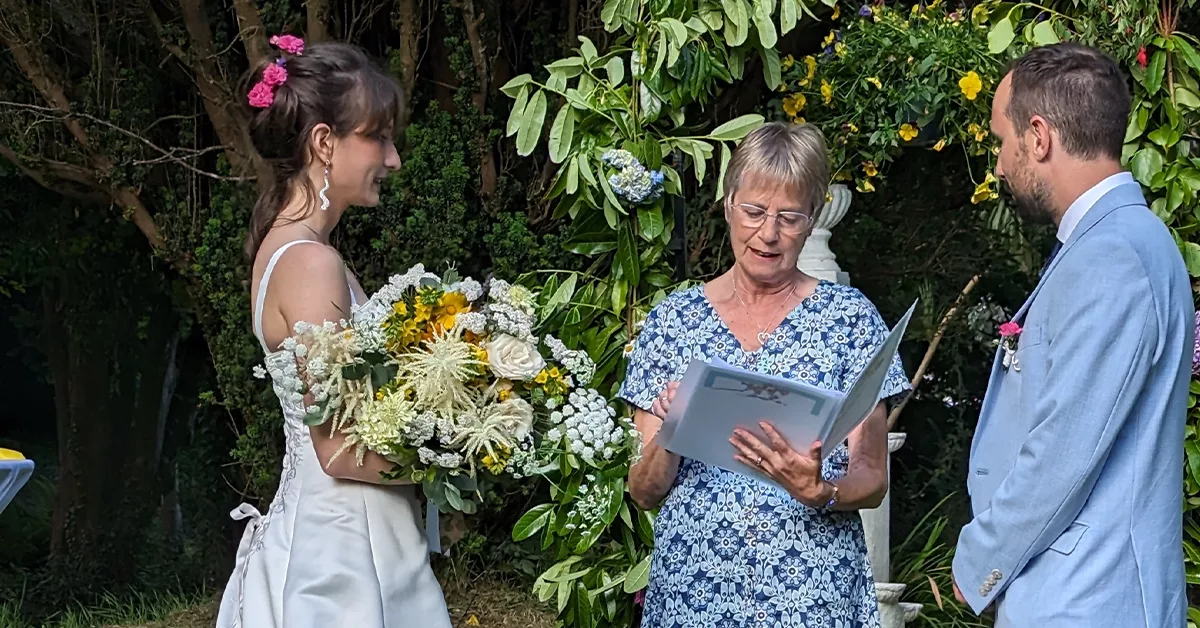
Vicky Christian is a humanist campaigner on the Isle of Man. A retired primary school teacher, Vicky has been instrumental in orchestrating several campaigns on the Isle of Man relating to issues of abortion, assisted dying, and much more. We had the privilege of talking to Vicky about her life of teaching and campaigning, her relationship with humanism, and the major progress on assisted dying.
Hi Vicky! How did you get involved with humanism?
I was brought up in a very Christian family, singing in church choirs. Being at Sunday school I didn’t question anything. That was the way the family ran. As I got older, I began to question what I had been led to believe all along. And my main thought was, how can a loving god allow massive plane crashes to happen? Or who invented diseases that make small children go blind? Or, you know, where does the loving god fit in? And more and more thinking about how this didn’t seem right to me.
And then I think it must have been on Radio 4, there was an interview, and I think it was Stephen Fry talking about humanism, and almost everything he said, I was saying to myself, ‘That’s me, that’s what I think’. About the goodness of human beings and how we accept things that can be proven, logic, and reason.
Also, I’ve always loved children and babies. I’ve been a teacher all my life, but I love people, and all this led to me researching humanism and getting into it and living my life as a humanist, and, to be honest with you, doing a bit of salesmanship for humanism as well. I’m asked to do non-religious funerals and I always correct that into ‘I do humanist funerals’ and I want to make the distinction between having a lack of religion and having a humanist belief system in place, which I find really helpful. I think I’ve probably influenced quite a few people to think of themselves as humanists. I think we all need it. Sometimes it’s really helpful to have an ism, as it were.
You’re also a humanist celebrant. Tell us more about that.
I also do a few weddings, a few renewal of vows ceremonies, a few baby-namings, but I think my favourite, by a long way, is doing humanist funerals. One of the skills that you have as a primary school teacher is that within the first day of meeting a class of, say, 30 children, by the end of the day, you know their names, and you get to know them, and you hope that they know you, and they know what your boundaries are. I think that the skill of going into a family home with a gathering of people who are newly bereaved, and walking in and making an instant connection with those families, that, I think, is a skill that has been developed through primary teaching.

Let’s talk about your campaigning work. Where did that start?
It began a long, long, long time ago, when my children were little. In the late 1970s, I ran a local playgroup because I didn’t want to work full time when I had two young little ones, so I did a playgroup so they could come with me to work. I had three campaigns done really quickly in that time. The local library didn’t have library books for children, so I campaigned and the local library got a children’s section. There was nothing for children to do in the outpatients department of the local hospital at that time, so we had a little campaign and built a big toy box, and we filled it with toys for children in the waiting room to play with. And the third thing, when I came back to the island in 1975, the maternity unit over here didn’t allow siblings to visit newborns because of infection worries. So, I campaigned on that as well, and we got children allowed to visit their mums, which I thought at the time was all I could do.
Then I got more and more involved with a small group of atheists over here. We got somebody called Mara Clarke in. She set up the Abortion Support Network, based in London, which pays for people who can’t access abortion in their countries. Every year, there were people from the Isle of Man being flown away for abortions. We brought her over to speak at a public meeting, which was very well received. And from that grew the CALM, the Campaign for Abortion Law Modernisation on the Isle of Man, and we had a very successful campaign. We now have probably the best abortion law in Europe here on the Isle of Man! We even have exclusion zones around the hospital, so if there are any campaigners liable to come and try and stop people going in, they can’t get near the place.
On the Isle of Man, whenever we mentioned having humanist representation on the hospital chaplaincy team for instance, we were greeted with ‘But we are a Christian country!’ We knew that large numbers of people on the Island were not Christians, but did not have the evidence to prove it. So I lobbied about it, and am happy to say that at our last census, without any fanfare, a ‘faith’ question was included!
I am now a volunteer on the Chaplaincy team too, available to speak to patients, families and staff if they have issues, and am included in annual meetings with new student nurses to explain what the team offers.
How did your assisted dying campaigning begin?
I joined My Death, My Decision, and began looking at how we could legalise assisted dying on the Isle of Man. We set up a My Death, My Decision group over here, and I was asked to join the Assisted Dying Coalition as the Isle of Man representative.
One thing that I would like to say is that my life has been influenced by Martin Luther King Jr. and the things that he says, that ‘injustice anywhere is a threat to justice everywhere’. I just find it totally impossible not to speak out. For people to get from the Isle of Man to Switzerland to avail themselves of assisted dying at Dignitas costs a heck of a lot of money. It is an equality issue, exactly the same way as the abortion is an equality issue. Young Manx women needing an abortion found it very difficult to raise the funds to go to Liverpool and Manchester to access an abortion.
Let’s talk about the Assisted Dying Bill on the Isle of Man. It passed its third reading last year, how did it feel to win the vote?
It was absolutely wonderful that day, because we had a bigger majority than we thought. It was a huge feeling of relief and exhilaration. We got 16 votes for it, that was just amazing. We were listening in, the tears flowed, and the phone calls going around – we did it, you know.
Editor’s note: The Isle of Man’s Assisted Dying Bill has passed its final stage in the Legislative Council 28 January 2025. If the changes made by the Council are agreed by the House of Keys, the bill will be sent for Royal Assent, with the new laws set to be place in 2027.
Finally, why do you think the Isle of Man and also Jersey, as Crown Dependencies, have had so much more progress on assisted dying than the UK? What advice would you give to campaigners in the UK?
Well, part of it is that we know each other over here. W have access to all the politicians. We’re given their phone numbers and their email addresses. It’s very easy to speak to them and let your feelings be known. I think that makes any campaign a lot easier.
In the UK, I think you need to convince local people and speak to people about their loved ones. This has been easy here, to get a local group going, who then can have lots of contact with their local politician to show the strength of feeling in their constituency.
Notes
Nathan Stilwell at nathan@humanists.uk or phone 07456 200033.
If you have been affected by the current assisted dying legislation, and want to use your story to support a change in the law, please email campaigns@humanists.uk
Read six reasons we need an assisted dying law.
Read more about our analysis of the assisted dying inquiry.
Read more about our work to legalise assisted dying in the UK.
Humanists UK is the national charity working on behalf of non-religious people. Powered by over 130,000 members and supporters, we advance free thinking and promote humanism to create a tolerant society where rational thinking and kindness prevail. We provide ceremonies, pastoral care, education, and support services benefitting over a million people every year and our campaigns advance humanist thinking on ethical issues, human rights, and equal treatment for all.
